The favourites of the cobbled classics - Van der Poel, Van Aert, Pogacar primed for the road to Roubaix
A glance at the men's peloton's rocky road to Flanders and Roubaix
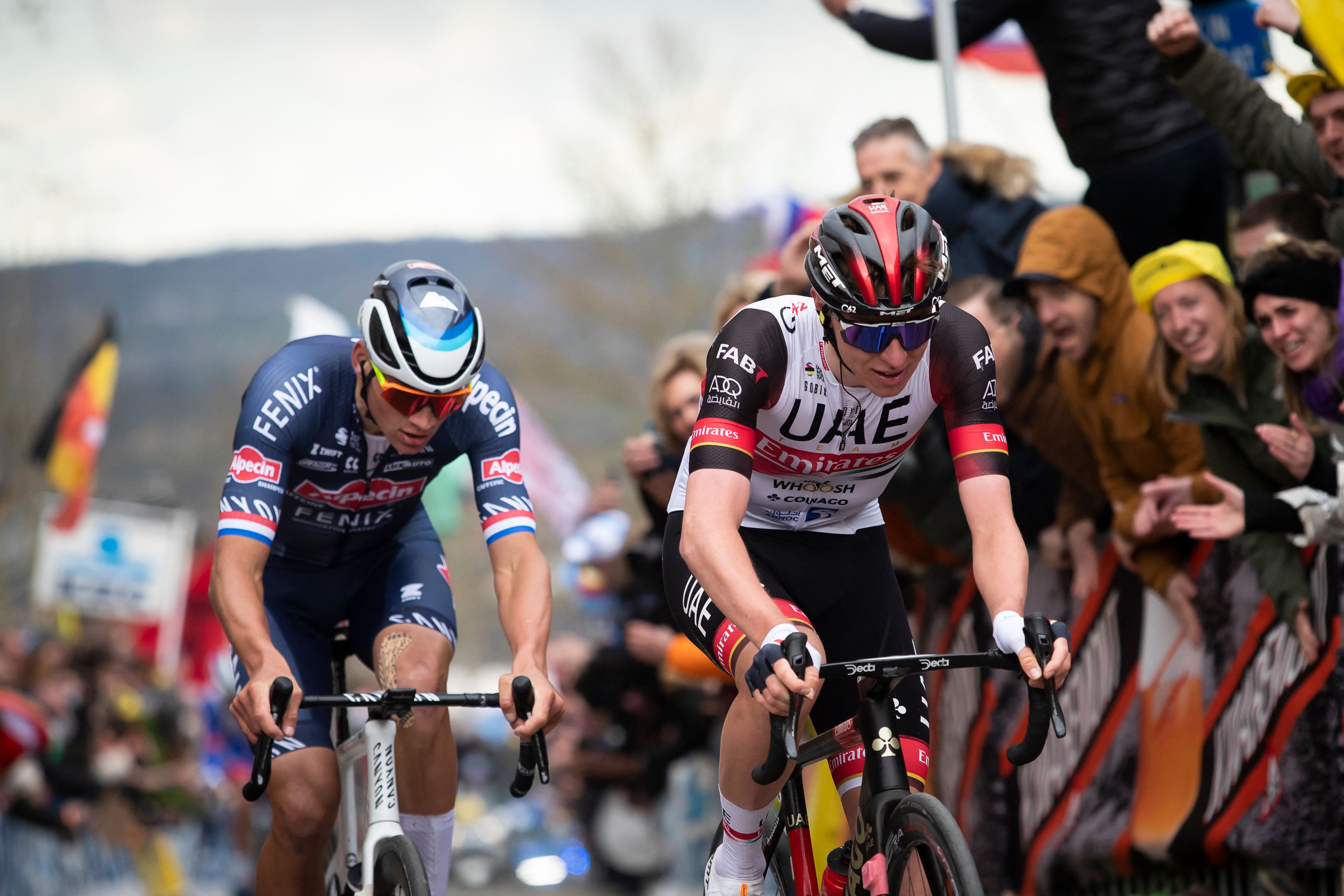
Mathieu van der Poel, Wout van Aert, and Filippo Ganna had barely shoehorned themselves into that comically narrow couch behind the Milan-San Remo podium when they found themselves being asked to cast their minds forward to the cobbled Classics. Over at the UAE Team Emirates bus, Tadej Pogačar was fielding similar questions.
It’s the most relentless time of the year. After the white-knuckle drama of the Poggio, thoughts turn rapidly to the contests ahead on the cobbles of Belgium and northern France. The cobbled Classics ‘season’ ostensibly begins with Brugge-De Panne on Wednesday, though the first real rendezvous for the Flanders contenders comes in Friday’s dress rehearsal at the E3 Saxo Bank Classic.
The outcome in Harelbeke typically establishes the final hierarchy of favourites for the Tour of Flanders – the E3-Ronde double has been completed four times in the last decade, after all – but Milan-San Remo already seemed to offer some rather firm indications as to the direction of travel over the coming weeks.
The obvious caveat is that racing on the Italian Riviera is an utterly different endeavour to competing in the Flemish Ardennes, but it’s also true that the strength of the top four on the Via Roma brooked no argument.
The margins are usually tight on the Poggio, but on Saturday, Van der Poel, Van Aert, Pogačar and Ganna were very clearly on another plane to the riders behind them. They powered clear not through sleight of positioning but thanks to sheer brute force – a sobering thought for those unable to follow.
The manner of Van der Poel’s victory strongly suggests that the Alpecin-Deceuninck rider has, as he did in cyclocross season, suddenly conjured up his very best form at precisely the right moment. After struggling during his seasonal debut at Strade Bianche, Van der Poel built up a head of steam at Tirreno-Adriatico before hitting the highest of notes at the crucial moment atop the Poggio.
Twelve months ago, Van der Poel won the Tour of Flanders and Dwars door Vlaanderen despite starting his season late due to a chronic back injury. It’s sobering to think that his condition appears to be rather more advanced at the same point this year, although Van der Poel’s rivals might be encouraged by a glance at the history books. Only three riders – Cyrille van Hauwaert, Sean Kelly and John Degenkolb – have won Milan-San Remo and Paris-Roubaix in the same year, while only Eddy Merckx himself has managed the Classicissima-Ronde double.
Get The Leadout Newsletter
The latest race content, interviews, features, reviews and expert buying guides, direct to your inbox!
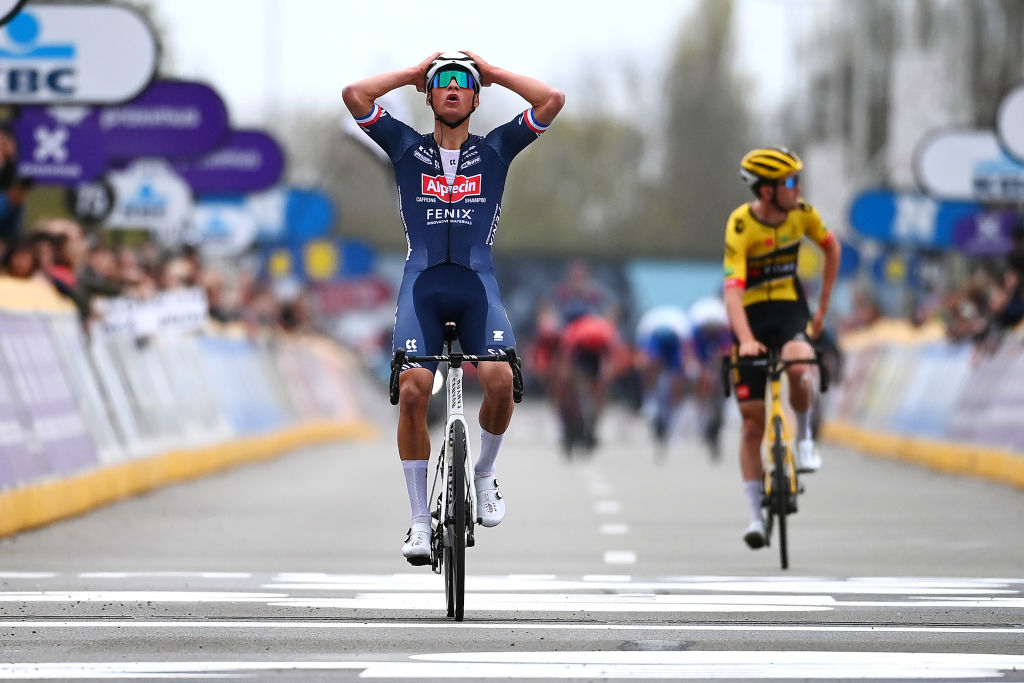
It would be tempting to couch Van der Poel’s victory as a significant psychological blow against his eternal rival Van Aert, although Marc Sergeant rebutted the idea in his Het Nieuwsblad column on Monday. “That would be the case with many riders, but not with Van Aert,” Sergeant wrote, pointing out that the Belgian never drops his head even when chasing apparently lost causes against Van der Poel.
"In cyclocross, he can ride at 10 seconds behind Van der Poel for an hour if necessary. Van Aert is not the type who ever thinks: 'I can't win against this Van der Poel.' On the contrary: he is ready for the Flemish Classics."
It’s worth noting, too, that while Van Aert was alone against Van der Poel et al on the Poggio, in Belgium, he will be backed by a remarkable Jumbo-Visma team that includes Omloop Het Nieuwsblad winner Dylan van Baarle and Kuurne-Brussel-Kuurne winner Tiesj Benoot. As QuickStep showed in years past, collective might and an array of potential winners is a heady cocktail on the cobbles.
Pogačar, by contrast, will be the lone spearhead at UAE Team Emirates, though men like Matteo Trentin and Tim Wellens will provide redoubtable support. After somehow contriving to place fourth in a two-man sprint at the Tour of Flanders last year, Pogačar will expect more from his Belgian expedition in 2023 – and the addition of E3 Harelbeke to his programme is a clear signal of intent.
Ganna flagged his credentials for the remainder of the Spring with his Milan-San Remo display, and he may even harbour regrets at not having the confidence to chase Van der Poel atop the Poggio. Paris-Roubaix is the Italian’s lone objective from here, and one imagines Ineos Grenadiers will resist the temptation to put him into the mix at the Tour of Flanders even if Tom Pidcock doesn’t return to action in time after the concussion he suffered at Tirreno-Adriatico.
The chasing pack
For years, the road to victory in the Flemish Ardennes and Roubaix ran through QuickStep, but their status as the natural team of leadership on this terrain has taken a battering over the past year or so. Their disastrous cobbled Classics campaign of 2022 was mitigated by the illnesses that afflicted so many of their riders, but Soudal-QuickStep disappointed at Opening Weekend and they find themselves in the alarming position of approaching the Ronde more in hope than expectation.
Julian Alaphilippe has been drafted back into the cobbled Classics unit this year and he presents an option they lacked in 2022, but the Frenchman has not yet scaled the heights of Pogačar, Van der Poel et al this season, victory at the Ardèche Classic notwithstanding. Patrick Lefevere’s recruitment has focused largely on Remco Evenepoel’s GC ambitions in recent years and the Classics team has suffered accordingly, but they still boast 2021 Tour of Flanders winner Kasper Asgreen and perennial contender Yves Lampaert. Between them, they might yet find a way to defy the consensus.
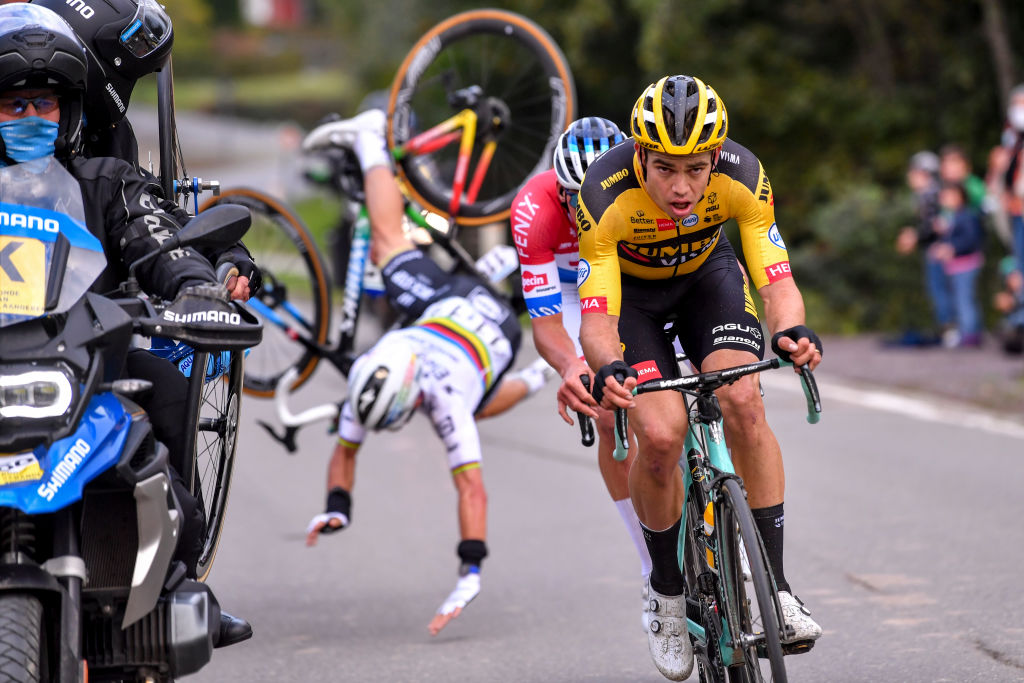
Biniam Girmay (Intermarché-Wanty-Gobert) was the breakout star of last Spring, but he left everybody wanting more when he ended his Classics campaign immediately after winning Gent-Wevelgem. His ease on the cobbles was striking last year, and his Tour of Flanders debut will be eagerly anticipated this time out. The 22-year-old was bubbling under at Tirreno-Adriatico.
Mads Pedersen (Trek-Segafredo) impressed at Paris-Nice and quietly sprinted to sixth place at Milan-San Remo. Already winner of Gent-Wevelgem in 2020 and second at the Ronde in 2018, the Dane appeared to step up another level last season and he is the rider nobody – not even Van Aert or Van der Poel – will want to sprint against over the coming weeks.
Elsewhere, Stefan Küng and Valentin Madouas form a very potent double act at a Groupama-FDJ squad growing in assurance on this terrain, while Matej Mohorič and Fred Wright fly the flag for Bahrain Victorious. Peter Sagan (TotalEnergies) lines out for his final tilt at the cobbles, Alexander Kristoff leads an ambitious young Uno-X squad, while all of Belgium will be closely watching the progress of Arnaud De Lie (Lotto-Dstny), so impressive at Omloop.
At a glance - the rocky road to Roubaix
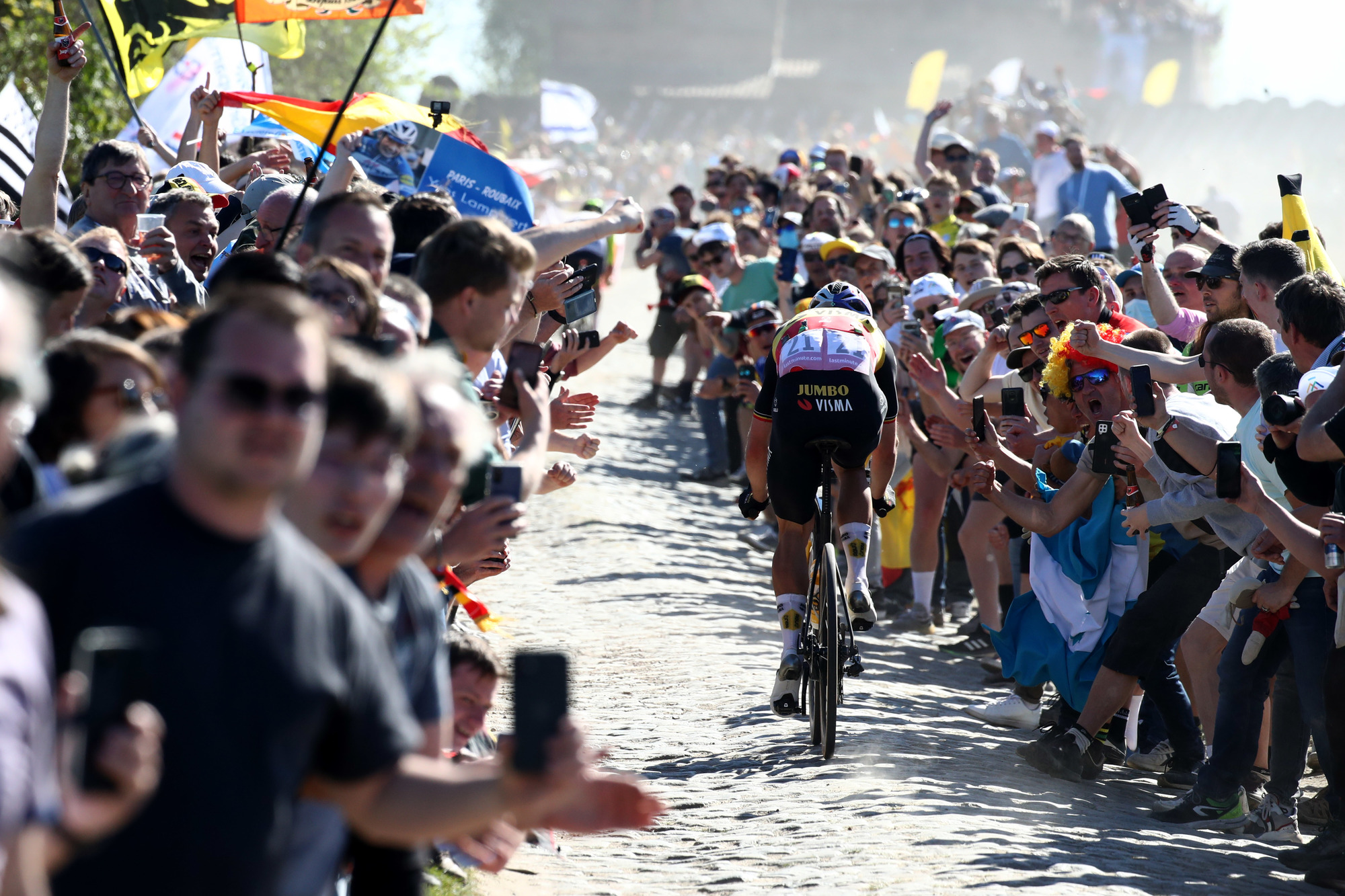
Minerva Classic Brugge-De Panne (Wednesday, March 22)
The old Three Days of De Panne was reduced to a one-day event and bumped from its prime real estate in the week before the Tour of Flanders to make way for Flanders Classics’ own Dwars door Vlaanderen in 2018. The addition of women’s race ensures there are still two days of action in De Panne, but the revamped Classic Brugge-De Panne is no longer a Ronde preparation race but rather an event very clearly oriented towards the sprinters.
The 211km course is almost entirely flat and the principal difficulty is provided by the wind rather than by cobbles. On reaching De Panne, the bunch must cover three-laps of an exposed, 47km finishing circuit where echelons are a constant threat. Past winners Sam Bennett (Bora-Hansgrohe) and Dylan Groenewegen (Jayco-Alula) feature alongside Fabio Jakobsen (Soudal-QuickStep), Mark Cavendish (Astana-Qazaqstan) and Jasper Philipsen (Alpecin-Deceuninck).
E3 Saxo Classic (Friday, March 24)
As recently as the 1990s, E3 Saxo Classic lent itself to a bunch sprint, but, like a painful Jenga puzzle, the organisers kept adding cobbles and hills to the route until it became (almost) de rigueur for Tour of Flanders contenders to race it. Since at least 2010, when Fabian Cancellara burned off Tom Boonen with disarming ease in the final kilometre, it has become the bellwether for Ronde form.
All the anticipated Tour of Flanders names will be present, from Pogačar to Van der Poel, and from the Paterberg to the Oude Kwaremont. A year ago, Van Aert and teammate Christophe Laporte were already clear ahead of the final climb of the Tiegemberg to complete a Jumbo-Visma one-two in Harelbeke.
Gent-Wevelgem (Sunday, March 26)
A race apart, Gent-Wevelgem eschews the familiar postage stamp of cobbles and hills in the Flemish Ardennes and instead seeks out its difficulties along the Franco-Belgian border. This year’s race also, incidentally, weighs in at a Monumental distance of 260km. As ever, the prevailing North Sea winds will have a big say in how the first half of the race unfolds, before the survivors hit the dirt roads of the so-called ‘Plugstreets’ and the denouement over the twin ascent of the Kemmelberg.
The 35km from the top of the Kemmel to the finish in Wevelgem always give the sprinters a fighting chance of clawing their way back on, but whatever the scenario, the race inevitably delivers a nail-biting finale on Vanackerestraat. Last year, Girmay’s fearless sprint from a four-man move was one of the highlights of the Spring.
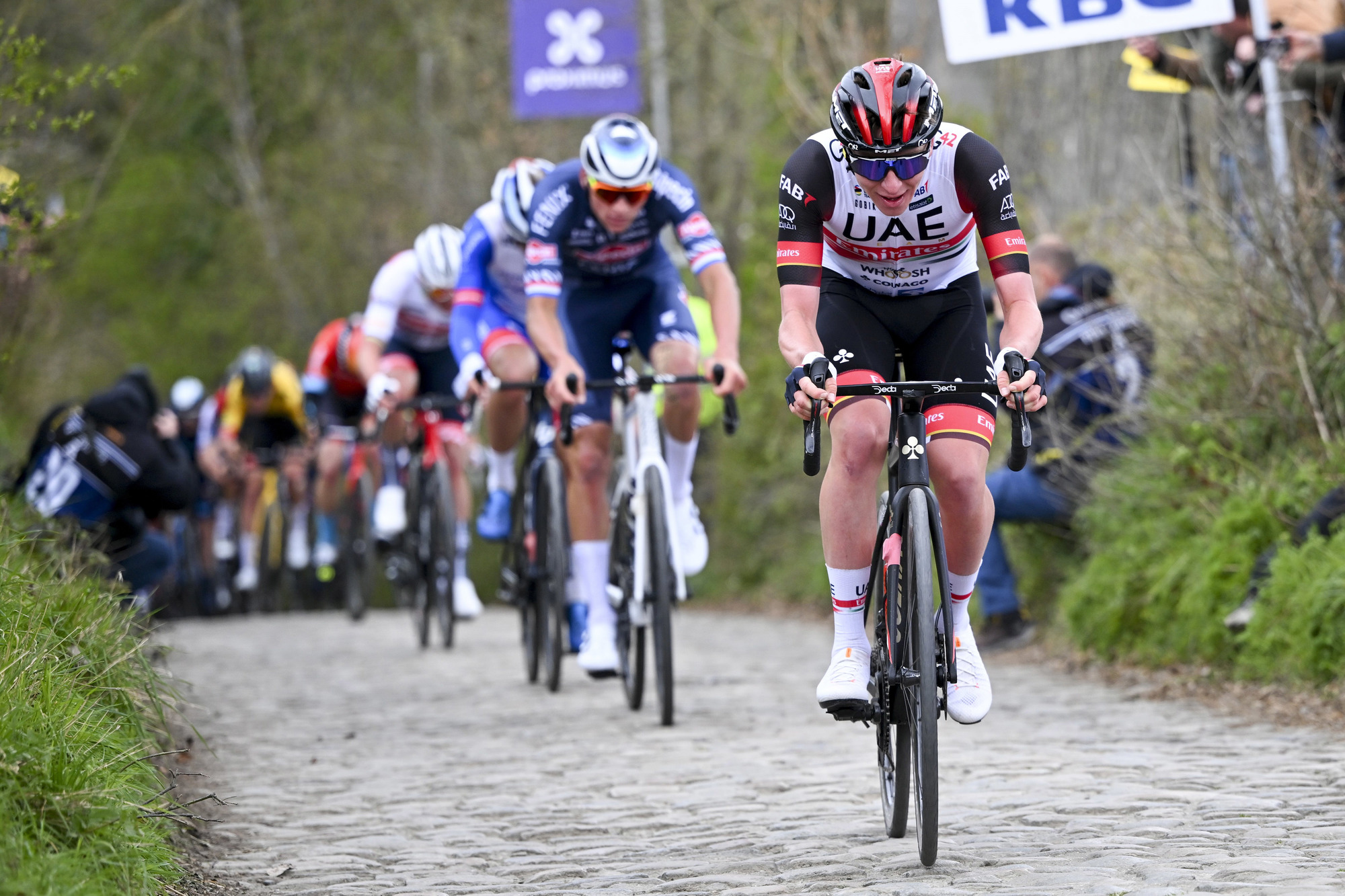
Dwars door Vlaanderen (Wednesday, March 29)
Until 2017, Dwars door Vlaanderen signalled the beginning of the 10-day countdown to the Tour of Flanders, but the race is now positioned as the final tune-up for Belgian cycling’s day of days. Flanders Classics reduced the distance slightly as a consequence, but they have been repaid with a stronger field.
For the past two years, Dwars door Vlaanderen has arguably been the most dynamic race of the Spring. Van Baarle claimed a sparkling solo win in 2021, while last year, Van der Poel won a breathless edition from an eight-man break that found common cause in working to stay clear of Pogačar after he was caught out of position with 80km to go.
Tour of Flanders (Sunday, April 2)
Belgian cycling’s highest holiday rarely disappoints. It took the peloton a few years to adapt to the shift from the old Muur-Bosberg finale to the current configuration over the Oude Kwaremont and Paterberg, but the new era of the Tour of Flanders seemed to begin in earnest with Philippe Gilbert’s dramatic solo victory of 2017. Since then, just about anything has seemed possible at the Ronde, where the days of contenders sitting on their hands until the final lap have long since passed.
Last year, the race was conditioned by Pogačar’s effervescent debut. The Slovenian blew the race to pieces on the first ascent of the Paterberg and he came within inches of dropping Van der Poel the second time up. Somehow, he contrived to finish off the podium at day’s end, but he returns to Flanders this year as a man on a mission. So too, of course, is Van Aert, who covets this race above all others. Van der Poel, meanwhile, is looking for a record-equalling hat-trick. Something has to give.
Scheldeprijs (Wednesday, April 5)
The flat course and the rapid finishing circuit around Schoten makes Scheldeprijs the quintessential sprinters’ classic, but last year’s race provided a break from the expected script. The peloton was splintered by crosswinds early on, and the front group would go the distance. 7km from home, strongman Alexander Kristoff – who would surely have fancied himself in a sprint – soloed clear to claim a resounding win. No matter, the fast men will return with designs on victory in 2023, with Jakobsen, Philipsen and Caleb Ewan (Lotto-Dstny) among the contenders.
Paris-Roubaix (Sunday, April 9)
For the first time in four years, Paris-Roubaix returns to its traditional slot, a week after the Tour of Flanders. The COVID-19 pandemic forced its cancellation in 2020 and its postponement to Autumn in 2021, then last year’s race was delayed by a week due to the French presidential election.
Twelve months ago, Filippo Ganna was listed among the favourites despite a spring blighted by illness. This time out, after a sparkling early-season, the Italian will be the subject of even greater attention in the build-up, though Van der Poel and Van Aert will both feel they have a score to settle with the Hell of the North.

Barry Ryan was Head of Features at Cyclingnews. He has covered professional cycling since 2010, reporting from the Tour de France, Giro d’Italia and events from Argentina to Japan. His writing has appeared in The Independent, Procycling and Cycling Plus. He is the author of The Ascent: Sean Kelly, Stephen Roche and the Rise of Irish Cycling’s Golden Generation, published by Gill Books.